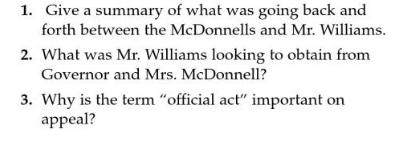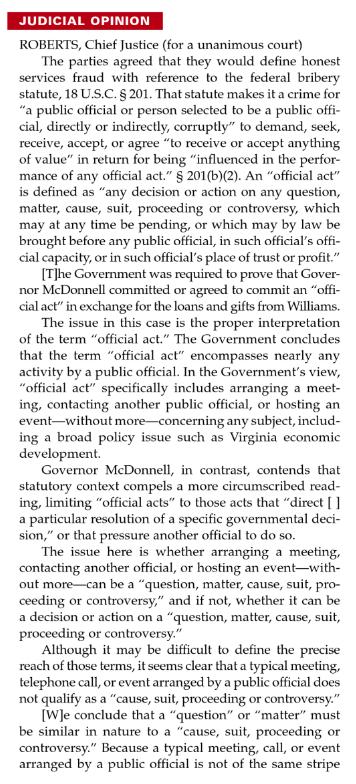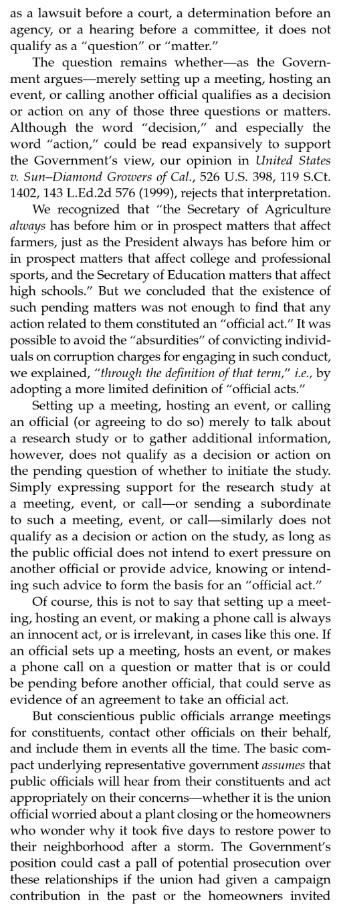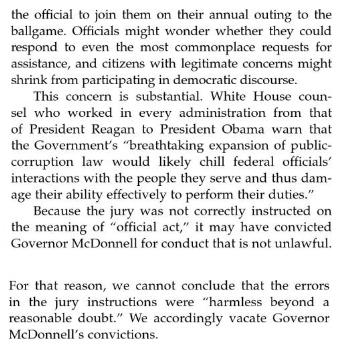Question: 1. Give a summary of what was going back and forth between the McDonnells and Mr. Williams. 2. What was Mr. Williams looking to




1. Give a summary of what was going back and forth between the McDonnells and Mr. Williams. 2. What was Mr. Williams looking to obtain from Governor and Mrs. McDonnell? 3. Why is the term "official act" important on appeal? JUDICIAL OPINION ROBERTS, Chief Justice (for a unanimous court) The parties agreed that they would define honest services fraud with reference to the federal bribery statute, 18 U.S.C. 201. That statute makes it a crime for "a public official or person selected to be a public offi- cial, directly or indirectly, corruptly" to demand, seek, receive, accept, or agree "to receive or accept anything of value" in return for being "influenced in the perfor- mance of any official act." 201(b)(2). An "official act" is defined as "any decision or action on any question, matter, cause, suit, proceeding or controversy, which may at any time be pending, or which may by law be brought before any public official, in such official's offi- cial capacity, or in such official's place of trust or profit." [T]he Government was required to prove that Gover- nor McDonnell committed or agreed to commit an "offi- cial act" in exchange for the loans and gifts from Williams. The issue in this case is the proper interpretation of the term "official act." The Government concludes that the term "official act" encompasses nearly any activity by a public official. In the Government's view, "official act" specifically includes arranging a meet- ing, contacting another public official, or hosting an event-without more-concerning any subject, includ- ing a broad policy issue such as Virginia economic development. Governor McDonnell, in contrast, contends that statutory context compels a more circumscribed read- ing, limiting "official acts" to those acts that "direct [ ] a particular resolution of a specific governmental deci- sion," or that pressure another official to do so. The issue here is whether arranging a meeting, contacting another official, or hosting an event-with- out more-can be a "question, matter, cause, suit, pro- ceeding or controversy," and if not, whether it can be a decision or action on a "question, matter, cause, suit, proceeding or controversy." Although it may be difficult to define the precise reach of those terms, it seems clear that a typical meeting, telephone call, or event arranged by a public official does not qualify as a "cause, suit, proceeding or controversy." [W]e conclude that a "question" or "matter" must be similar in nature to a "cause, suit, proceeding or controversy." Because a typical meeting, call, or event arranged by a public official is not of the same stripe as a lawsuit before a court, a determination before an agency, or a hearing before a committee, it does not qualify as a "question" or "matter." The question remains whether-as the Govern- ment argues-merely setting up a meeting, hosting an event, or calling another official qualifies as a decision or action on any of those three questions or matters. Although the word "decision," and especially the word "action," could be read expansively to support the Government's view, our opinion in United States v. Sun-Diamond Growers of Cal., 526 U.S. 398, 119 S.Ct. 1402, 143 L.Ed.2d 576 (1999), rejects that interpretation. We recognized that "the Secretary of Agriculture always has before him or in prospect matters that affect farmers, just as the President always has before him or in prospect matters that affect college and professional sports, and the Secretary of Education matters that affect high schools." But we concluded that the existence of such pending matters was not enough to find that any action related to them constituted an "official act." It was possible to avoid the "absurdities" of convicting individ- uals on corruption charges for engaging in such conduct, we explained, "through the definition of that term," ie, by adopting a more limited definition of "official acts." Setting up a meeting, hosting an event, or calling an official (or agreeing to do so) merely to talk about a research study or to gather additional information, however, does not qualify as a decision or action on the pending question of whether to initiate the study. Simply expressing support for the research study at a meeting, event, or call-or sending a subordinate to such a meeting, event, or call-similarly does not qualify as a decision or action on the study, as long as the public official does not intend to exert pressure on another official or provide advice, knowing or intend- ing such advice to form the basis for an "official act." Of course, this is not to say that setting up a meet- ing, hosting an event, or making a phone call is always an innocent act, or is irrelevant, in cases like this one. If an official sets up a meeting, hosts an event, or makes a phone call on a question or matter that is or could be pending before another official, that could serve as evidence of an agreement to take an official act. But conscientious public officials arrange meetings for constituents, contact other officials on their behalf, and include them in events all the time. The basic com- pact underlying representative government assumes that public officials will hear from their constituents and act appropriately on their concerns-whether it is the union official worried about a plant closing or the homeowners who wonder why it took five days to restore power to their neighborhood after a storm. The Government's position could cast a pall of potential prosecution over these relationships if the union had given a campaign contribution in the past or the homeowners invited the official to join them on their annual outing to the ballgame. Officials might wonder whether they could respond to even the most commonplace requests for assistance, and citizens with legitimate concerns might shrink from participating in democratic discourse. This concern is substantial. White House coun- sel who worked in every administration from that of President Reagan to President Obama warn that the Government's "breathtaking expansion of public- corruption law would likely chill federal officials' interactions with the people they serve and thus dam- age their ability effectively to perform their duties." Because the jury was not correctly instructed on the meaning of "official act," it may have convicted Governor McDonnell for conduct that is not unlawful. For that reason, we cannot conclude that the errors in the jury instructions were "harmless beyond a reasonable doubt." We accordingly vacate Governor McDonnell's convictions.
Step by Step Solution
3.49 Rating (166 Votes )
There are 3 Steps involved in it
Petitioner former Virginia Governor Robert McDonnell and his wife Maureen McDonnell were indicted by the Federal Government on honest services fraud a... View full answer

Get step-by-step solutions from verified subject matter experts


